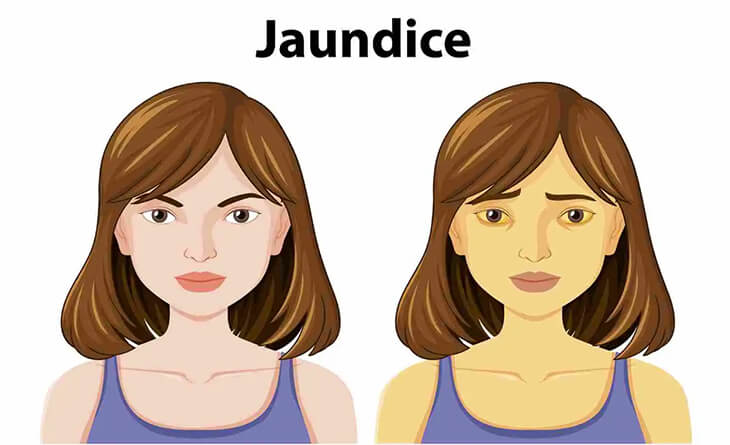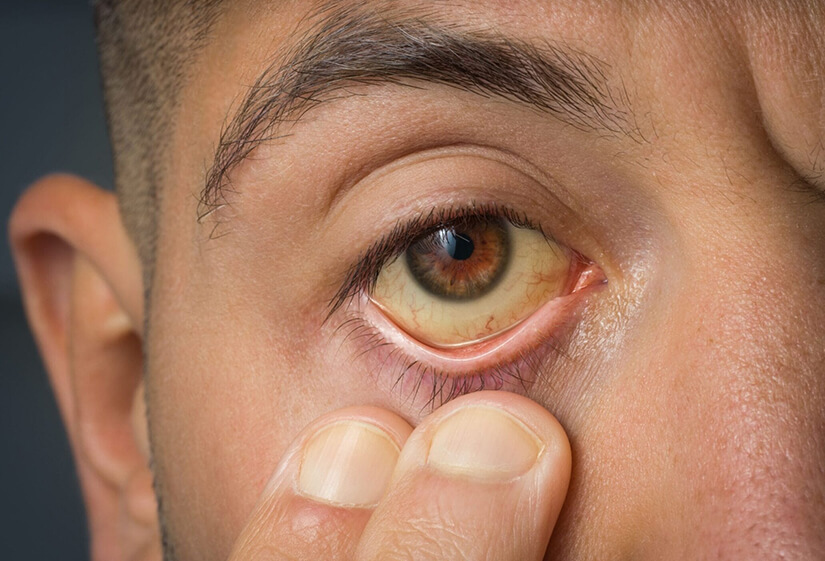Yellow Eyes (Jaundice Eyes): Causes, Symptoms & Treatments
Have your eyes lost their natural white shine and turned yellow? It may look like a small change, but in reality, your body could be trying to tell you something important. Yellow eyes are often a sign of a health issue, not just in your eyes, but in your liver or blood.
Ignoring this change can delay treatment and lead to serious health problems. In many cases, the right yellow eye treatment at the right time can stop things from getting worse.
Let’s understand why eyes turn yellow, what other signs to watch out for, and how it can be treated properly.
What Causes Yellow Eyes?
The most common yellow eyes reason is a substance called bilirubin. It forms in your body when old red blood cells break down. Normally, your liver processes bilirubin and removes it from the body. But when the liver is not working properly, or when there’s a blockage in the bile ducts, bilirubin starts building up in the blood.
When this happens, it first appears in the white part of your eyes, causing them to turn yellow.
Some of the common reasons for this include:
- Hepatitis (A, B, or C) – a liver infection
- Fatty liver – often caused by obesity, alcohol, or diabetes
- Gallstones – which block bile flow
- Liver cirrhosis – long-term liver damage
- Excessive alcohol use
- Hemolysis – fast breakdown of red blood cells
- Certain medicines or supplements
In simple words, yellow eyes usually mean your liver is under stress or there is an issue with your body’s blood or bile system.
Other Signs That May Appear Along With Yellow Eyes
Yellow eyes rarely come alone. Here are some other signs to look out for:
- Dark yellow or brown urine
- Pale or whitish stool
- Tiredness or body weakness
- Loss of appetite
- Pain on the right side of the stomach
- Itchy skin
If you notice two or more of these symptoms along with yellowing eyes, it’s crucial to seek medical attention immediately. This could be a sign of a serious health issue that needs to be addressed promptly.
How Do Doctors Find the Cause?
Getting the right yellow eye treatment starts with proper diagnosis. Your doctor may suggest:
- Blood tests – to check liver function and bilirubin levels
- Ultrasound or CT scan – to see your liver, gallbladder, and bile ducts
- Hepatitis tests – to rule out infection
- MRI or MRCP – to check for hidden blockages or tumours
An experienced eye doctor in Delhi can often spot the signs early and guide you toward the next steps with a liver or general physician.

Treatment for Yellow Eyes: What Can Be Done?
Treatment depends on the exact cause of the yellow eyes. Here are the common options:
- Treating the Main Cause
If hepatitis or fatty liver is the reason, the doctor will prescribe antiviral medicines or suggest lifestyle changes. If it’s due to gallstones or a blockage, surgery or endoscopy may be needed.
- Liver-Supportive Medicines
In mild cases, medicines to support liver function and improve bile flow are given.
- Diet & Lifestyle Changes
Avoiding oily food, quitting alcohol, and eating home-cooked meals can support recovery. Regular walks or light exercise also help improve liver health.
- Hospital Admission
In serious cases like liver failure or very high bilirubin levels, you may need to be admitted for stronger treatment.
It’s important to remember that every step of your yellow eye treatment should be guided by professional advice and test reports, not guesswork or home remedies. Professional diagnosis and treatment are crucial for your recovery.
Home Tips to Support Your Recovery
While medical treatment is important, small changes at home can help you heal faster:
- Drink 8–10 glasses of water daily
- Eat more green vegetables and fresh fruits
- Avoid fried, processed, or spicy foods
- Don’t take unnecessary medicines or painkillers
- Rest properly, don’t overwork yourself
These steps don’t replace treatment but can support your healing along with it.
Common Myths About Yellow Eyes (That You Should Stop Believing)
| Myth | Reality |
| Only alcohol causes yellow eyes | Even non-drinkers can get jaundice due to liver infections or fatty liver |
| Yellow eyes will go away on their own | Sometimes they worsen without treatment |
| It’s only a cosmetic issue | No, it signals an internal health issue—often in your liver or blood |
Believing these myths can delay the correct yellow eye treatment, especially if you don’t feel pain.
When Should You See a Doctor?
If your eyes remain yellow for more than 2–3 days, or if you feel very tired, weak, or notice dark urine, it’s essential to visit a doctor as soon as possible. Ignoring these symptoms could lead to serious health problems.
Your eyes may be showing signs of something deeper. An expert eye doctor in Delhi can help you detect problems early and connect you with the right treatment. By being proactive and seeking early detection, you can take control of your health and prevent potential complications.
Remember, you’re not alone in this. Professional help is available to guide you through your yellow eye treatment and ensure your overall health and well-being. Don’t hesitate to seek help when you need it.
If you or your loved one is experiencing yellowing of the eyes, don’t delay. Dr. Anisha Gupta, a leading eye doctor in Delhi, is experienced in detecting eye-related signs of internal issues, such as jaundice and liver stress. With a compassionate approach and accurate diagnostics, she works with specialists to ensure you receive the most suitable yellow eye treatment at the right time.
Book your appointment today with Dr. Anisha Gupta and take the first step toward healthy eyes and better overall health. Your eyes can speak for your body; make sure you listen.

